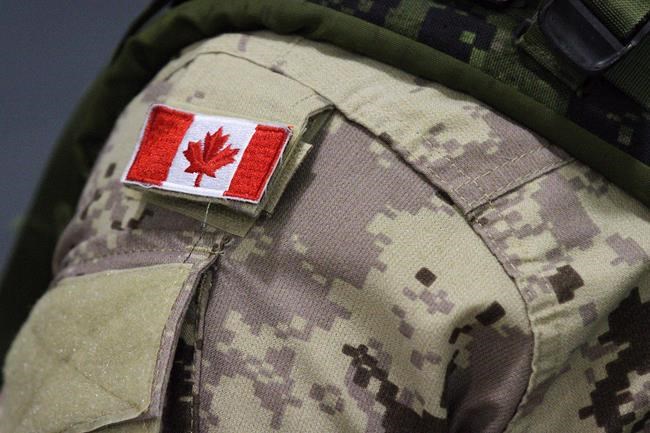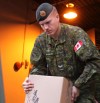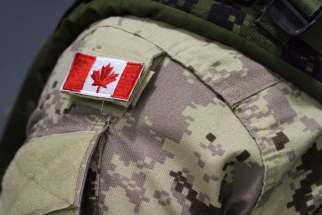New military policy encouraging start
Read this article for free:
or
Already have an account? Log in here »
To continue reading, please subscribe:
Monthly Digital Subscription
$0 for the first 4 weeks*
- Enjoy unlimited reading on winnipegfreepress.com
- Read the E-Edition, our digital replica newspaper
- Access News Break, our award-winning app
- Play interactive puzzles
*No charge for 4 weeks then price increases to the regular rate of $19.00 plus GST every four weeks. Offer available to new and qualified returning subscribers only. Cancel any time.
Monthly Digital Subscription
$4.75/week*
- Enjoy unlimited reading on winnipegfreepress.com
- Read the E-Edition, our digital replica newspaper
- Access News Break, our award-winning app
- Play interactive puzzles
*Billed as $19 plus GST every four weeks. Cancel any time.
To continue reading, please subscribe:
Add Free Press access to your Brandon Sun subscription for only an additional
$1 for the first 4 weeks*
*Your next subscription payment will increase by $1.00 and you will be charged $16.99 plus GST for four weeks. After four weeks, your payment will increase to $23.99 plus GST every four weeks.
Read unlimited articles for free today:
or
Already have an account? Log in here »
Hey there, time traveller!
This article was published 21/07/2020 (1967 days ago), so information in it may no longer be current.
Since the time former master corporal Patrik Mathews was identified as a white supremacist who was allegedly inciting racial violence, there have been disturbing questions: why did it take an undercover journalist to publicly expose the reservist’s behaviour? Why didn’t the military expel the poison within its ranks before it became a front page story?
The answers to those questions might not come until the trial of Mr. Mathews, who is in custody in the U.S., accused by the FBI of participating in a plot to start a race war.
Forces issues new orders on 'hateful conduct'

Posted:
OTTAWA - The Canadian Armed Forces has issued new orders to military personnel as senior commanders seek to address allegations of having been soft on hate in the ranks.
In the meantime, the Canadian Armed Forces last week issued orders for military personnel to take a harder line on “hateful conduct.” This policy requires troops to report to their commanders all such incidents — including, presumably, overhearing colleagues such as Mr. Mathews express hateful views — and commanders are required to act when incidents are reported to them.
In the eight years Mr. Mathews was a reservist, before the Free Press first reported his white-supremacist activities in 2019, he worked as a member of 38 Canadian Brigade Group in Winnipeg. His position as a combat engineer would have kept him in close contact with colleagues on training courses, during military exercises and possibly during social activities as casual as going for a beer.
It stretches the limits of credulity to imagine that none of his workmates had heard hateful comments from Mr. Mathews, whose views are so strong he recorded himself advocating for killing people, poisoning water supplies and derailing trains to incite a civil war in the name of creating a white “ethno-state.”
In fact, Mr. Mathews told the Free Press he tried to recruit two of his colleagues for a white-supremacist group called The Base.
The military’s new policy bans anything– words, images or symbols — that encourages, justifies or promotes violence or hatred against individuals or groups.
There’s a long history of military personnel as “brothers in arms,” a term that means group members have each other’s backs against outsiders: what happens within the group, stays within the group. One can reasonably speculate this tradition of tacit silence played a part in Mr. Mathews’ fellow reservists’ failure to come forward with suspicions there was a dangerous racist in their midst.
Mr. Mathews’ case is not the only instance that has tarnished the Canadian military with links to hateful behaviour. Sailors tied to the white supremacist Proud Boys group disrupted a Mi’kmaq ceremony in Halifax in 2017, and a military intelligence report in 2018 identified 53 service members as belonging to hate groups or having otherwise made discriminatory or racist statements between 2013 and 2018.
The military’s new policy bans anything — words, images or symbols — that encourages, justifies or promotes violence or hatred against individuals or groups. This includes discrimination based on nationality or ethnic background, race, colour, religion, age, gender, sexual orientation, marital status or disability.
The policy as written seems sound, if overdue. But it’s just words until action is taken to begin the laborious process of changing the military culture so that everyone, from generals to greenhorn privates, takes it as a personal mission to root out hatred.
The military is actively trying to recruit more women, visible minorities and Indigenous people. The words of the anti-hate policy will sound encouraging to the type of marginalized candidates the military seeks. But only action will convince potential candidates the military is a safe place for all Canadians to don a uniform.











